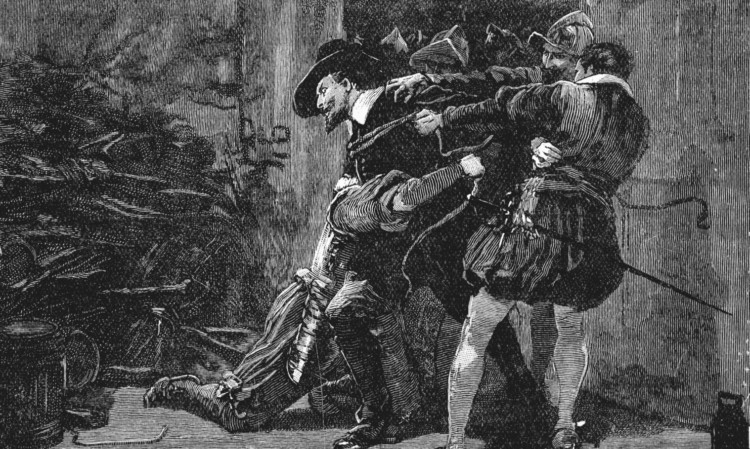Four hundred and eight years ago today Guy Fawkes was found hiding in an undercroft beneath the House of Lords. He was guarding 2,500kg of gunpowder which would have been used to blow up the Houses of Parliament, killing James VI and I along with the rest of the royal family and much of England’s political elite.
The plan, led by Robert Catesby, was to slay the Protestant king and replace him with a Catholic monarch.
Loose lips sink ships, however, and so it was with the gunpowder plot. An opportunistic peer, Lord Monteagle, learned of the plot and informed the king.
Fawkes was arrested and tortured until he revealed his co-conspirators. They were sentenced to have their genitals cut off and burned in front of them, before being hanged and quartered.
Fawkes escaped this unappealing end by leaping from the gallows and breaking his neck.
But what would have happened if his dastardly plot had succeeded?
Dr Andrew MacDonald is a senior history lecturer at Dundee University focusing on early modern Scotland and Britain.
If the plot had succeeded, he says, the impact would have been much greater than just a smouldering crater where the Houses of Parliament now stand.
“It would have been huge not just because of the death of the monarch and the ruling class, but because Great Britain might never have existed,” he said.
“If James VI and I had been killed there would have been no one in Scotland who had a place in the English royal family.
“The Union of the Crowns would have been very short lived and very brutally ended. Some English noble would have taken the throne and there would have been no impetus for the Treaty of Union.
“Guy Fawkes and his co-conspirators were not only targeting the Royal Family, they were targeting Scots in London.
“James had come up from another country and given jobs to all his mates. There was a strong anti-Scots element in London.”
In any case, had the plot succeeded the conspirators almost certainly would not have achieved their ultimate goal of putting a Catholic on the throne.
“They were too few in numbers to do it,” Dr MacDonald explained. “But more importantly, assassination doesn’t tend to lead to revolution. Revolution sometimes leads to assassination but not usually the other way round. England would have found someone similar and put them on the throne.”
Had the plot succeeded, it is not likely we would be having a referendum on independence next year there would be no need.
“There is the possibility that Scotland might have been conquered by England at some point in the future,” Dr MacDonald said. “But there was no real reason for England to invade.
“England and Scotland would both have had Protestant monarchs. They would have faced a largely Catholic-led Europe so it would have been in both countries’ best interest to maintain friendly relations.”
Nor does Dr MacDonald think financial need would have driven Scotland into England’s arms.
“The Darien Scheme came about because Scotland had no-one to trade with after the Union of the Crowns,” he said. “England passed a law that no foreign ships could trade with its territories.
“And the territories Scots would have traded with wouldn’t touch them because they were mostly enemies of England. Because the two countries shared a monarch Scotland was seen by them as an extension of England.
“They ended up with no-one to trade with, which is why they came up with the disastrous Darien Scheme.”
Another likely consequence of a successful gunpowder plot is that Shakespeare would not have produced Macbeth.
It was written to curry favour with James: but he wouldn’t have been around had Fawkes had his way.
“On a wider cultural note almost everything would be different,” Dr MacDonald said. “One of the key reasons why the Scots language disappeared as a language of learning and literature, and particularly government, was because of the Union of Crowns.
“A lot of Scottish nobles disappeared to England and married English heiresses. The language in Scotland in the 17th century was extremely different from that in England, but by 1700 they were virtually indistinguishable.
“Had the gunpowder plot succeeded I see no reason why Scots would not have remained a distinct language instead of being subsumed by its more dominant and muscular neighbour.”
There is also the possibility that the wider world would have been quite different had Guy Fawkes’ plan succeeded.
The loss of its ruling elite might have shattered England’s ambitions so much that the sun would never have risen on the British Empire.
“It could have been England’s Flodden,” Dr MacDonald said. “That battle saw a lot of Scottish noblemen fall and severely damaged the country’s confidence.
“In 1605 England’s colonial adventures were just beginning. It might well have been the case that France, the Netherlands and others would have made hay from a lack of competition.”
And is it possible that we might now have been labouring under a President David Cameron?”
It’s possible, I suppose, but not very likely,” he said. “The gunpowder plot was a group of monarchists looking to replace the king they didn’t like with the one they did.
“I suppose there could have been something like the French Revolution but in any case Scotland would have remained an independent country.
“I think the Hamilton Dynasty would have emerged as Scotland’s ruling class. Maybe they would have been bampots who fomented revolution within a fortnight. Who knows?
“You can have a lot of fun speculating on what might have been.”
